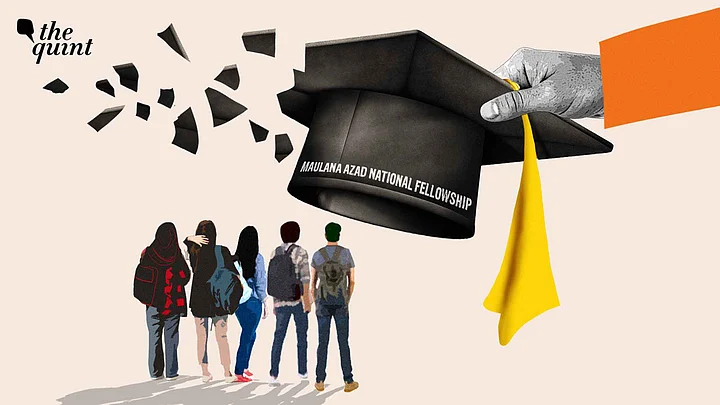The Maulana Azad National Fellowship (MANF), which has benefitted thousands of minority students in the past, has been discontinued by the Centre from the year 2022-2023, on the grounds that it was overlapping with other scholarships.
In a press release, dated 8 December, the Union Ministry of Minority Affairs stated, "Since the MANF Scheme overlaps with various other fellowship schemes for higher education being implemented by the Government and minority students are already covered under such Schemes, hence the Government has decided to discontinue the MANF Scheme from 2022-23."
In conversation with The Quint, academicians questioned the move, the justification provided by the centre, and the impact this will have on minority students, particularly on Muslim students.
Why The Fellowship Was Important for Minority Students
Started under the UPA government, the fellowship was a part of measures to implement the recommendations of the Sachar Committee, which studied the socio-economic and educational condition of Muslims in India.
Harish Wankhede, Assistant Professor of Centre for Political Science, Jawaharlal Nehru University (JNU), said, “It is important to look at the empirical evidence from various reports such as the Mandal Commission and the Sachar Committee report that show that a large population of Muslims are educationally backward. The Sachar committee report brings out stark realities such as high drop-out rates among Muslim students. The fellowship was a wonderful scheme -- It was very important, particularly for those from lower-income backgrounds.”
The scheme was open to Muslim, Sikh, Parsi, Buddhist, Christian and Jain students pursuing higher studies. The degrees included regular and full-time M.Phil and Ph.D. degrees in Sciences, Humanities, Social Sciences, and Engineering and Technology. The fellowship was aimed at aiding students from minority communities, who are pursuing their higher education, particularly in central universities.
According to the criteria on the fellowship website, the annual income of beneficiaries or their guardians, would not exceed Rs six lakh per annum from all sources. The fellowship would provide assistance between Rs 10,000 to Rs 28,000 per month.
N Sukumar, Professor, Department of Political Science, Delhi University, said, "In addition to support from family, which is generally very limited for most students, the fellowship would help minority students cover travel, books, and other academic costs. It is mostly lower-income Muslim students who avail of the fellowship." He added, "Why is the government reducing funds for minority students when education is the only way to uplift them?"
Syed Ali Nadeem Rezavi, Professor, Department of History, Aligarh Muslim University (AMU), said,
This move will lead to several hardships for Muslim students. The fellowship would aid lower-income groups. It will impact Muslims, and women, as the fellowship would give them economic liberty despite opposition from home.Syed Ali Nadeem Rezavi, Professor, Aligarh Muslim University (AMU)
‘Where is The Overlap?’
While the Minister of Minority Affairs, Smriti Irani, stated 'overlap' as a reason, she did not specify which fellowships MANF was clashing with.
Speaking about this, Apoorvanand, Professor, Hindi Department, Faculty of Arts, Delhi University, said, “This is a vague reason. The rule is that one student cannot avail of more than one scholarship or fellowship. They were not specific about which scholarships the fellowship overlapped with. No two scholarships are the same in nature. So, if there really is an overlap or a duplication, then they should provide more details on that.”
Professor Rezavi said that there are other scholarships that cover students from Scheduled Castes, Scheduled Tribes, and Other Backward Classes. However, scholarships for religious minorities are limited.
Referring to the Junior Research Fellowship (JRF) scheme of the University Grants Commission (UGC) that is open to all, on the basis of a qualifying exam, Rezavi said, “Not everyone qualifies for the JRF. Hence, MANF was a very good option for economically backward Muslim students. If the government really means what it is saying about the overlap, then why not provide names of alternate programmes?”
Professor Wankhade told The Quint;
There should have been some substantive reason provided for discontinuing the fellowship. And if it is being discontinued, then is there a better framework or policy in place for the students?
Highlighting why such fellowships are important, Apoorvanand said, “Such scholarship and fellowships are important because they uplift individuals from a certain community. And the same individuals are part of these communities. So even if 10 Muslim students are getting a fellowship to pursue higher education, that has an impact on building the profile of the community.”
(At The Quint, we question everything. Play an active role in shaping our journalism by becoming a member today.)
